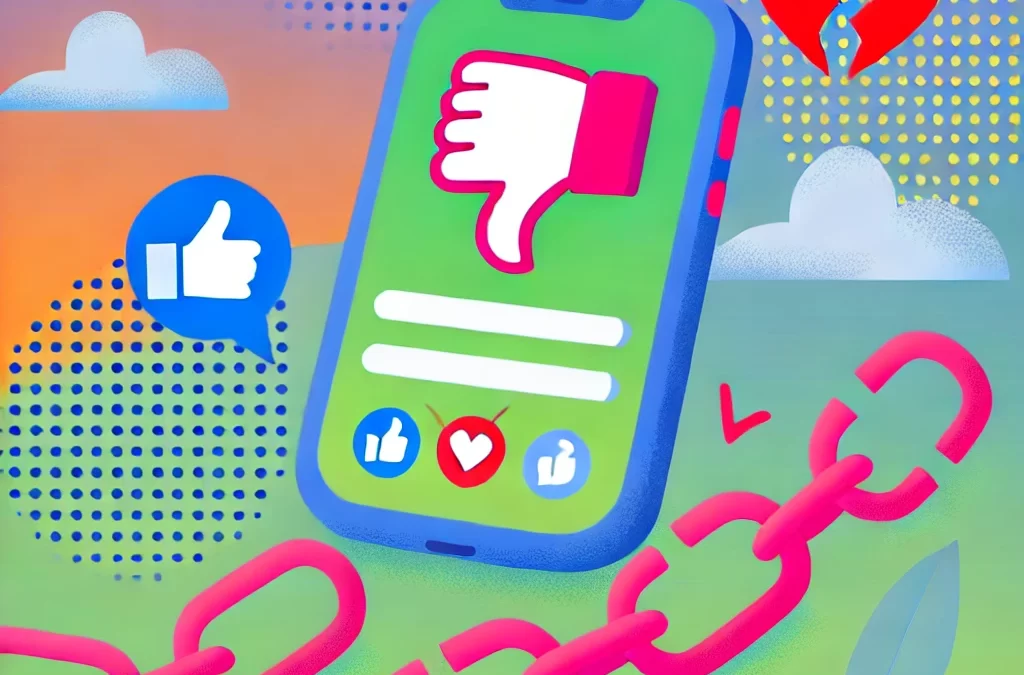A few girls from our Girl Scouts troop recently embarked on the aMAZE journey…for Cadettes (6th-8th grade). On this journey, “girls twist and turn through aMAZE and they gain tips and strategies for creating healthy relationships and long-lasting friendships.”
We first discussed the differences between physical aggression (kicking, punching), verbal aggression (name-calling, teaching) and moved to define relational aggression. Relational aggression is a type of psychological or social bullying where individuals harm others by manipulating or damaging their relationships, social status, or feelings of inclusion. Instead of using physical violence, it involves tactics like spreading rumors, excluding others from a group, giving the “silent treatment,” or using gossip to control or hurt someone. It often occurs in friendships or social circles and can cause emotional distress and damage to a person’s self-esteem.
Relational aggression tends to be more common among girls, and one reason could be that girls, more than boys, are often socialized to avoid direct confrontation. Instead of addressing conflicts openly, they may use indirect methods like exclusion, gossip, or spreading rumors to manage social dynamics. This can happen because they might feel uncomfortable with open conflict, worry about hurting someone’s feelings, or fear damaging their social status. As a result, instead of solving problems directly, relational aggression becomes a way to control or express frustration in their relationships.
While this behavior can happen in all genders, societal norms around how girls are expected to handle emotions and relationships may contribute to why relational aggression is more prevalent among them. Encouraging assertive communication and conflict resolution skills can help reduce this type of behavior by promoting more direct and healthier ways of dealing with issues.
Our discussion on navigating friendships sparked an important and insightful conversation about girls, friendships, and the impact of relational aggression. Here’s what we explored:
Gossip, Social Media, and Cancel Culture.
We began by discussing how gossip spreads quickly, both in-person and online, and the significant role that social media and certain individuals (often controversial kids) play in this process. When gossip escalates, it can lead to what’s known as “cancel culture.” This happens when one person or a group convinces others to drop a friend, either because they believe the friend has done something wrong or simply as a power move. The problem with cancel culture is that it often bypasses healthy, assertive communication—something the girls agreed is much harder to practice, but ultimately more beneficial.
Cancel culture can create a toxic environment where mistakes are less likely to be forgiven, and girls are often judged harshly for their behavior. Girls who address issues need guidance on emotional intelligence, empathy, and assertive communication skills to navigate conflicts in a healthier way. We also have to address groupthink and peer pressure for girls who may feel pressured to participate in canceling someone, even if they don’t fully agree with it, to avoid becoming targets themselves. This can reinforce harmful behaviors within a group and make it harder to stand up for what’s right.
Friendship: The Maze of Chutes and Ladders.
We used a game-like analogy to start our conversation. We asked the girls to think of their friendships like a maze, full of bumps along the way. If friendships were like a game of “chutes and ladders,” what brings them down the chute or up the ladder? The girls brought up important points like jealousy, controlling personalities, and girls who enjoy drama. We talked about how these dynamics can lead to exclusion and relational aggression, like when girls use group chats to create inside jokes and exclude someone, or when they become distant and unresponsive in person (the girls called this being dry.)
Authentic Friendships and Core Values.
We dove into what makes a friendship authentic, guided by the “Brain-Based Life Hacks” book. The girls identified characteristics of a good friend: a person who is caring, supportive, fun, and willing to talk through issues. We also learned that authentic friendships boost feel-good chemicals like oxytocin and serotonin, making us feel happier and healthier.
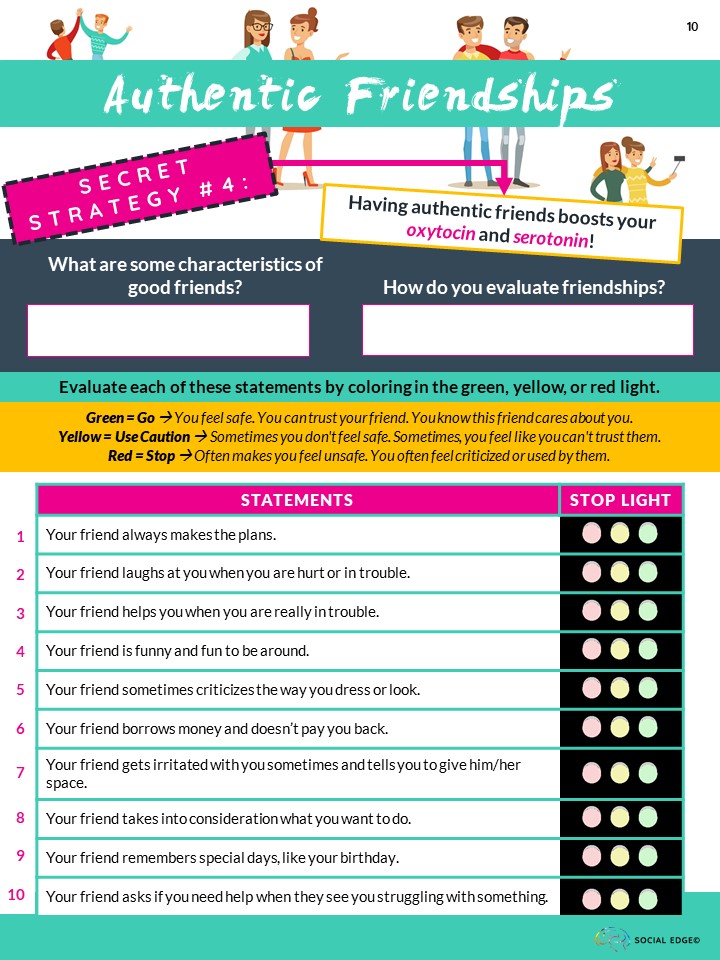
We introduced the idea of “Red Light, Yellow Light, and Green Light” friends:
Red Light Friends: Those who make you feel unsafe, criticized, or controlled.
Yellow Light Friends: Friends you sometimes feel unsure about. Sometimes you feel like you can’t trust them.
Green Light Friends: Friends who make you feel safe and trusted. You know this friend cares about you.
An interesting observation came up during the discussion: some friends are nice at school but don’t want to hang out outside of school or respond to messages. The girls realized these “fake friends” might not cancel them outright, but they also don’t invest in the relationship.
Peer Pressure: Positives & Negatives
We also discussed how peer pressure can be both positive and negative, referencing Brain-Based Life Hacks (p.13). We explained how positive peer pressure can encourage beneficial behaviors, like improving grades, exercising, eating healthier, or trying new activities. On the flip side, negative peer pressure can lead to harmful habits or risky behaviors. We extended the conversation by exploring the role of dopamine in peer pressure. Dopamine is released in the brain when it anticipates a reward. For example, when you’re with friends and they encourage you to do something, dopamine expects rewards like high fives, compliments, or laughter, pushing you to “just do it.” Understanding the difference between positive and negative peer pressure helps guide your decisions in line with your values, beliefs, and goals.
We then explored various ways children can experience negative pressure. Verbally, this might include reasoning (providing reasons why something is okay to do), put-downs (insulting or name-calling), or rejection (threatening to exclude someone from a friendship). Non-verbal pressure can also occur, like “the look” (a glance that suggests someone shouldn’t do something), “the popular” (pressuring others to buy certain brands to fit in), or “the huddle” (a group gathering to exclude someone). We encouraged the girls to recognize that these behaviors push others to be someone they’re not, rather than accepting them for who they truly are.
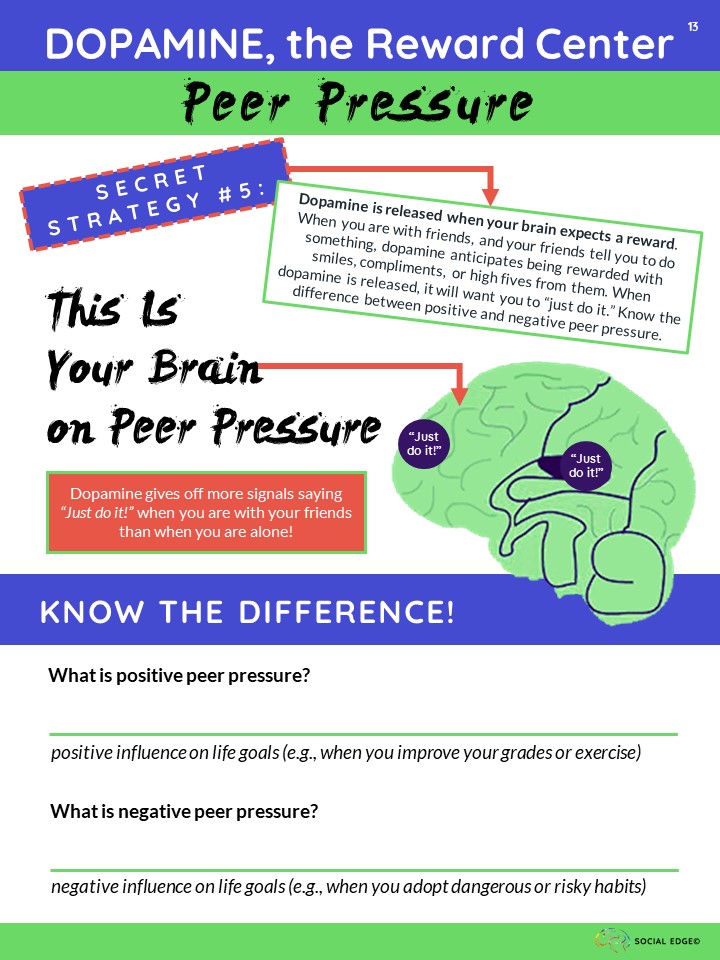
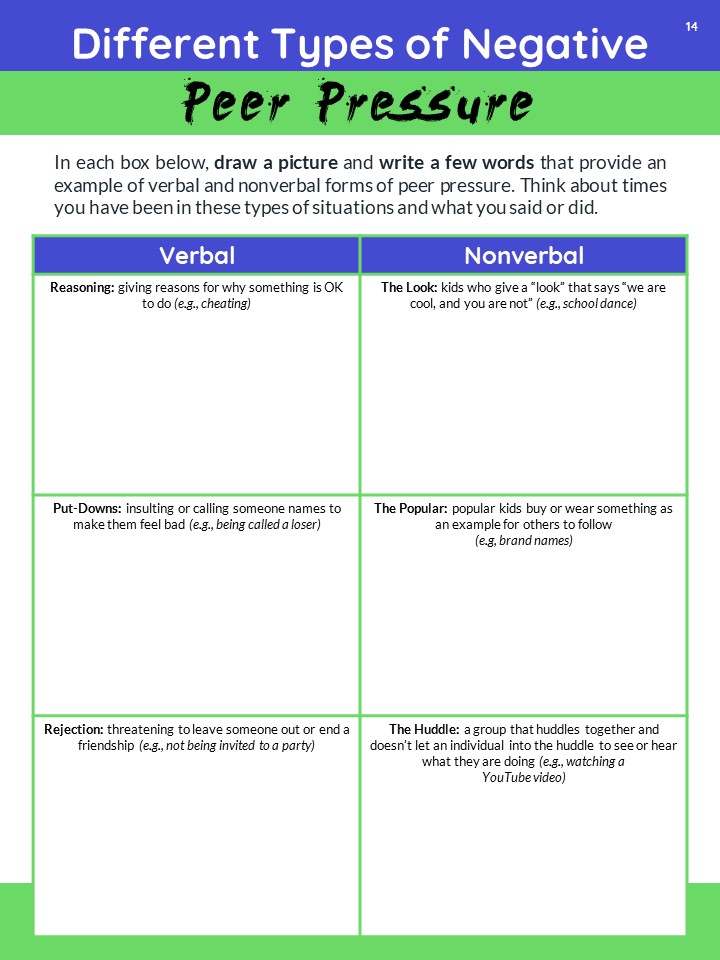
Conflict Resolution & Emotional Intelligence.
We finished by practicing assertive communication skills from “Brain-Based Life Hacks” conflicting resolution page (p.12) using the formula, “I feel ___ when ___ happens.” The girls learned the importance of timing, avoiding judgment, expressing feelings, and being clear about the next steps in a relationship. This approach is key to emotional intelligence—handling conflict rather than avoiding it.
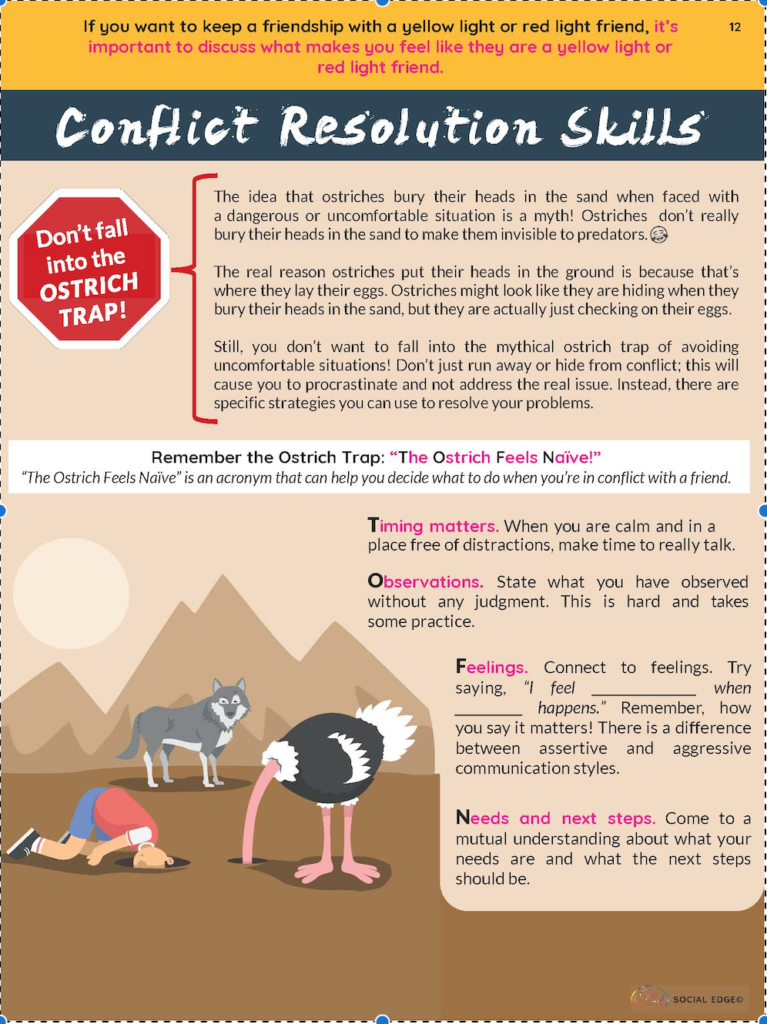
By teaching these skills, we hope to foster a community where girls can build authentic friendships, solve conflicts directly, and avoid the harm that gossip and cancel culture can cause. With more authentic friends in our lives, we not only feel better but also create a kinder, more caring world for ourselves and others.
Peacemaker Kit
As part of the aMaze Journey each girl makes a Peacemaker Kit to collect tips and tools they can use to create peace in their lives and in the world around them.
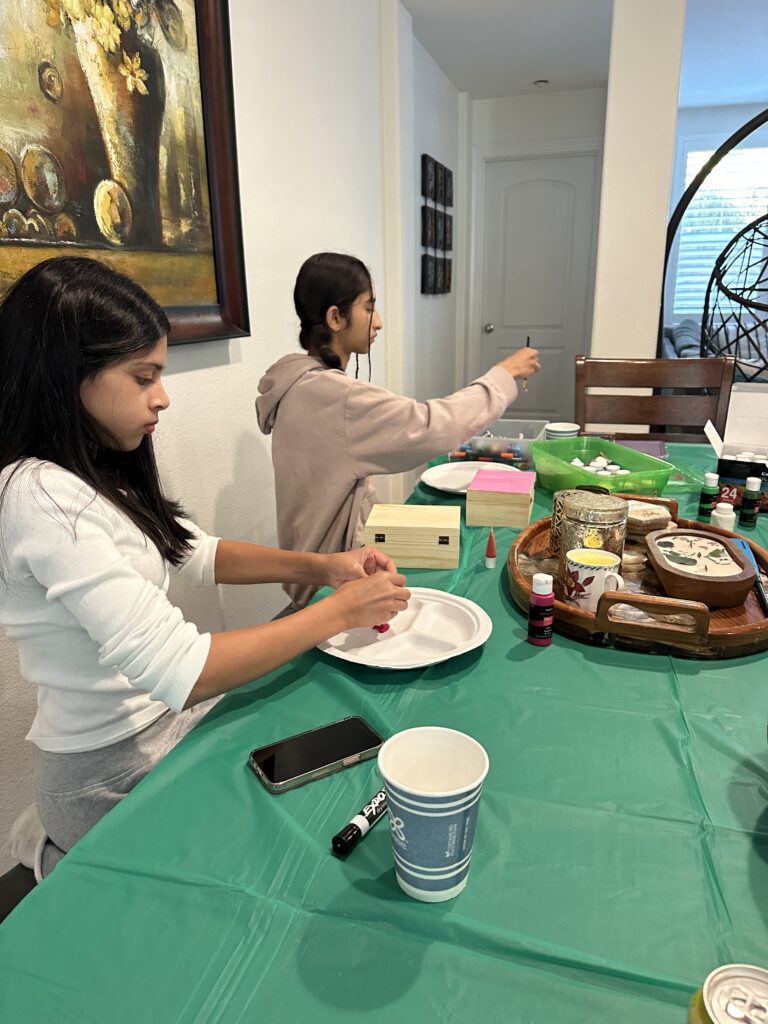
The girls made peacemaker kits to keep inspiring quotes or messages they found related to be an authentic friend and using assertive communication.
These kits can also be used to brainstorm and write down ways to have better friendships. Thinking through strategies to improve friendships, or thinking through what they would do differently if they have any problems or issues with friends. Evaluating their friendships, what works and what doesn’t is an important part of being a peacemaker in the world 🙂

